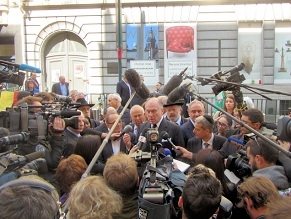|
World Jewish News

Ronald Lauder addressing reporters outside the Jewish Museum in Brussels
|
After terror attack, international Jewish leaders in solidarity mission to Brussels
03.06.2014, Jews and Society The leaders of the World Jewish Congress (WJC) and of the Belgian Government today agreed to work together on issues related to improving Holocaust education and the fight against anti-Semitism, racism and terrorism. At meetings in Brussels on Monday between a WJC solidarity mission comprised of 38 Jewish leaders with Belgium’s Prime Minister Elio Di Rupo, Foreign Minister Didier Reynders, Interior Minister Joëlle Milquet and Justice Minister Annemie Turtelboom, both sides agreed on the necessity to strengthen cooperation on a European and world-wide level to prevent further deadly attacks such as the one committed at the Jewish Museum of Belgium in Brussels.
In his meeting with the WJC delegation which lasted 90 minutes, Di Rupo called for closer European cooperation to fight radical movements and pledged that there would be no tolerance of hate speech. He also highlighted the need to address the problem of fighters coming back from the conflict in Syria and perpetrating acts in Europe. He said it also was the role of governments to ensure society as a whole remained united in the face of such criminal acts.
The prime minister also agreed to set up a joint commission of the government, the WJC and the Jewish community of Belgium tasked with identifying measures to improve security for the Jewish community, to fight growing hatred, including on the internet, to strengthen Holocaust education in schools and to facilitate the exchange of information.
Speaking outside the Jewish museum in central Brussels, where on 24 May 2014 three people were killed and one gravely wounded, WJC President Ronald S. Lauder told reporters: “What we don’t want is that a young generation of Jews grows up with fear.”
The meetings in the Belgian and European capital came the day after French police apprehended a suspect in the shooting rampage. Mehdi Nemmouche, 29, a native of France, allegedly fought in Syria. Lauder said that the authorities must act firmly and decisively to clamp down on violent fanatics. “Coming back to a Europe they hate, they were taught to kill. How we stop them, I don't know, but we know very much that security forces today in Europe have to be made much stronger. They are not able yet to handle some of these people…Security forces in Europe must be strengthened. They are unfortunately not yet able to combat the general radicalization effectively,” Lauder said.He urged Europeans improve the sharing of intelligence between the EU different countries on matters of counter-terrorism.
The threat that is posed by Islamism, he said, “not only affects Jews, it also affects Christians in the Middle East. Thousands have fled from Syria. It’s the same ideology.” Nor, he said, was the Arab-Israel conflict to blame for the rising tide of hatred: “Even if Israel made peace with the Palestinians tomorrow, this wouldn’t eradicate anti-Semitism.” Moreover, “The internet is a major factor in the indoctrination and radicalization of young Muslims. It is important that we take this issue seriously.”
Lauder was joined by Maurice Sosnowski, president of the Coordinating Committee of Jewish Organizations in Belgium (CCOJB) who praised the reaction of the Belgian authorities as “exemplary” and said that Belgian Jewry is “in permanent, close contact with the police and the various government ministries.” The community was in a quandary, he said: “We need to protect Jewish sites, but as a Belgian Jew I don’t want to live in a ghetto guarded permanently by police.”
Sosnowski blamed the politicization of the school system for the climate of unease in which Belgian Jews live. “Unfortunately, Holocaust education is often inadequate,” he said. “Instead of talking about the Shoah, some teachers prefer to talk about the Israeli-Palestinian conflict, and they put Israel on a par with the Nazis. That is not acceptable.”
WJC
|
|
